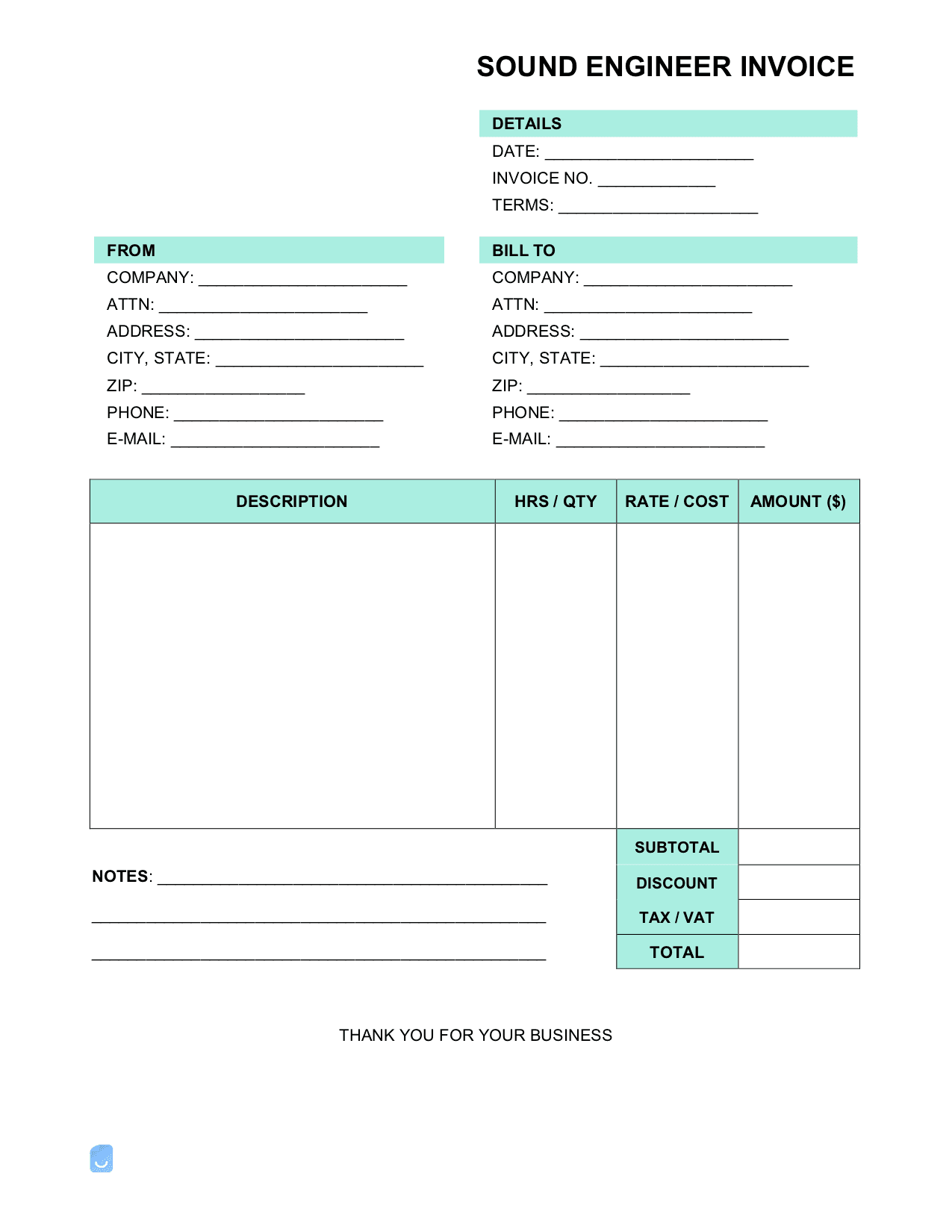Sound Engineer Invoice Template
A sound (audio) engineer invoice is a form used to request payment for services provided by a full-time or contracted sound engineer. Tasks can include mixing, editing, and mastering recorded music for studios and independent artists. With a digital invoice, sound engineers can list the services that were completed for the client, list any important notes, and provide their contact information to ensure the client has a means of reaching out to them for questions or additional work.

What is a Sound Engineer?
A sound engineer, also called an audio engineer, is an individual that works on the technical side of the commercial music, film, video game, and radio industries to record and improve audio through the use of digital instruments. The career is often described as a mix of both creative and technical skills, as audio engineers often rely an equal amount on their ear to improve the sound of a recording as computers and other tools. In the music industry, sound engineers are responsible for completing four (4) major steps in the production process, which consist of sound recording, editing, mixing, and mastering. Sound engineers can choose to focus on a single aspect of the production process or provide all services. Within the field of sound engineering lie several types of specifications and job types. Some of these include:
- Studio Sound Engineer
- Recording Engineer
- Mixing Engineer
- Mastering Engineer
- Systems Engineer
- Front-of-House Engineer
Regardless of the exact sub-specialty, all audio engineers are rooted in both the artistic and technical sides of music creation.
Becoming a Sound Engineer
Sound engineers can hail from backgrounds rooted in formal education to those based on first-hand experience and self-taught skills. Like many jobs, the path to a financially rewarding career is just as dependent on networking and skill as on education. For example, in the music industry, famous singers and bands are likely to work with sound engineers known in the industry and have been working with other famous musicians—not because other sound engineers are necessarily worse. Still, it’s often less of a risk as the more well-known engineers have already proven they harbor the skill to record, master, and edit a hit song or album. For those looking to receive a formal audio engineering education, the following paths can be pursued: Associate’s Degree (2-year) – Earning an associate’s degree can offer students the working basics, giving them the means to obtain employment in the audio industry as entry-level audio technicians. It is recommended that online colleges be avoided, as audio engineering is very hands-on due to the varying audio equipment types, including audio workstations, MIDI controllers, microphones, and other studio gear. Bachelor’s Degree (4-year) – Those looking to earn a bachelor’s degree should expect to dedicate four (4) to five (5) years of their life to studying a wide variety of courses made up of general education, business, music fundamentals, and creation, and technical classes. After completing a Bachelor’s degree, Master’s degree options are available in select universities across the United States. Certifications (Optional) – Certifications demonstrate to customers and potential employers that a sound engineer has an adept understanding of a certain subcategory or field of audio production or expertise in a type of digital tool. Two (2) very popular certifications acquired by practicing audio engineers are the Avid Certified Operator in Pro Tools and the Certified Audio Engineer issued by the Society of Broadcast Engineers (SBE).
Sound Engineer Salary & Hourly Rate ($/hr)
The salary of a sound/audio engineer depends on a variety of factors, including the engineer’s experience, the field or company in which they work, their education, and their desired workload. According to Glassdoor and PayScale, the following are the average national figures for both: Salary: $67,360/yr (source: BLS) Hourly Rate: $32.38/hr (source: BLS)